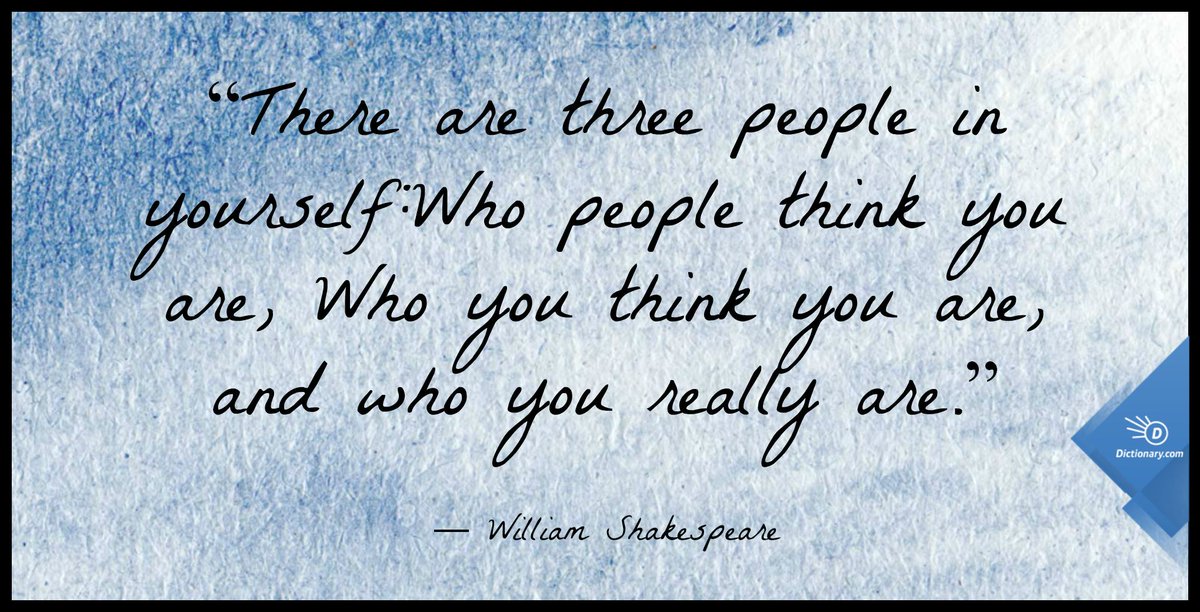Or becoming self-actualized - the difference between me and you.
[Self-actualized people are those who were fulfilled and doing all they were capable of.]
Self-actualization
Instead of focusing on
psychopathology
and what goes wrong with people, Maslow (1943) formulated a more
positive account of human behavior which focused on what goes right. He
was interested in human potential, and how we fulfill that potential.
Psychologist Abraham Maslow (1943, 1954) stated that human motivation
is based on people seeking fulfillment and change through personal
growth. Self-actualized people are those who were fulfilled and doing
all they were capable of.
The growth of self-actualization (Maslow, 1962) refers to the
need for personal growth and discovery that is present throughout a
person’s life. For Maslow, a person is always 'becoming' and never
remains static in these terms. In self-actualization a person comes to
find a meaning to life that is important to them.
As each person is unique the motivation for self-actualization
leads people in different directions (Kenrick et al., 2010). For some
people self-actualization can be achieved through creating works of art
or literature, for others through sport, in the classroom, or within a
corporate setting.
Maslow (1962) believed self-actualization could be measured
through the concept of peak experiences. This occurs when a person
experiences the world totally for what it is, and there are feelings of
euphoria, joy and wonder.
It is important to note that
self-actualization is a continual process of becoming rather than a
perfect state one reaches of a 'happy ever after' (Hoffman, 1988).
Maslow offers the following description of self-actualization:
'It
refers to the person’s desire for self-fulfillment, namely, to the
tendency for him to become actualized in what he is potentially.
The
specific form that these needs will take will of course vary greatly
from person to person. In one individual it may take the form of the
desire to be an ideal mother, in another it may be expressed
athletically, and in still another it may be expressed in painting
pictures or in inventions' (Maslow, 1943, p. 382–383).
Maslow (1968): Some of the characteristics of self-actualized people
Although we are all, theoretically, capable of self-actualizing, most
of us will not do so, or only to a limited degree. Maslow (1970)
estimated that only two percent of people will reach the state of self
actualization. He was particularly interested in the characteristics of
people whom he considered to have achieved their potential as persons.
By
studying 18 people he considered to be self-actualized (including
Abraham Lincoln and Albert Einstein) Maslow (1970) identified 15
characteristics of a self-actualized person.
Characteristics of self-actualizers:
1. They perceive reality efficiently and can tolerate uncertainty;
2. Accept themselves and others for what they are;
3. Spontaneous in thought and action;
4. Problem-centered (not self-centered);
5. Unusual sense of humor;
6. Able to look at life objectively;
7. Highly creative;
8. Resistant to enculturation, but not purposely unconventional;
9. Concerned for the welfare of humanity;
10. Capable of deep appreciation of basic life-experience;
11. Establish deep satisfying interpersonal relationships with a few people;
12. Peak experiences;
13. Need for privacy;
14. Democratic attitudes;
15. Strong moral/ethical standards.
Behavior leading to self-actualization:
(a) Experiencing life like a child, with full absorption and concentration;
(b) Trying new things instead of sticking to safe paths;
(c) Listening to your own feelings in evaluating experiences instead of the voice of tradition, authority or the majority;
(d) Avoiding pretense ('game playing') and being honest;
(e) Being prepared to be unpopular if your views do not coincide with those of the majority;
(f) Taking responsibility and working hard;
(g) Trying to identify your defenses and having the courage to give them up.
The
characteristics of self-actualizers and the behaviors leading to
self-actualization are shown in the list above. Although people achieve
self-actualization in their own unique way, they tend to share certain
characteristics. However, self-actualization is a matter of degree,
'There are no perfect human beings' (Maslow,
1970a, p. 176).
It
is not necessary to display all 15 characteristics to become
self-actualized, and not only self-actualized people will display them.
Maslow did not equate self-actualization with perfection.
Self-actualization merely involves achieving ones potential. Thus,
someone can be silly, wasteful, vain and impolite, and still
self-actualize. Less than two percent of the population achieve
self-actualization.
Educational applications
Maslow's (1968) hierarchy of needs theory has made a major
contribution to teaching and classroom management in schools. Rather
than reducing behavior to a
response in the environment,
Maslow (1970a) adopts a holistic approach to education and learning.
Maslow looks at the entire physical, emotional, social, and intellectual
qualities of an individual and how they impact on learning.
Applications of Maslow's hierarchy theory to the work of the
classroom teacher are obvious. Before a student's cognitive needs can be
met they must first fulfil their basic physiological needs. For example
a tired and hungry student will find it difficult to focus on learning.
Students need to feel emotionally and physically safe and accepted
within the classroom to progress and reach their full potential.
Maslow
suggests students must be shown that they are valued and respected in
the classroom and the teacher should create a supportive environment.
Students with a
low self-esteem will not progress academically at an optimum rate until their self-esteem is strengthened.
Source:
Simple Psychology
So, if you are still wondering what is wrong with our social system, our economic system, our judicial system, our educational system, our governmental system and religious systems I suggest you click on this
link and take to heart, take personal responsibility for what you are as a person and start acting accordingly.
--Joe
 I have never made a political endorsement, not in the conventional sense. This is because Christendom has committed a great many sins in its insatiable thirst for power over the centuries. In fact, the quest for power is the church’s most heinous sin. So officially aligning a congregation with any political party – left, right, or populist – only perpetuates this transgression. However, as this unprecedented election season comes to a merciful close, I am making my first endorsement: I can’t vote for “him,” and I won’t vote for “her.” Neither will I vote for any of the half-dozen candidates on the presidential ballot.
I have never made a political endorsement, not in the conventional sense. This is because Christendom has committed a great many sins in its insatiable thirst for power over the centuries. In fact, the quest for power is the church’s most heinous sin. So officially aligning a congregation with any political party – left, right, or populist – only perpetuates this transgression. However, as this unprecedented election season comes to a merciful close, I am making my first endorsement: I can’t vote for “him,” and I won’t vote for “her.” Neither will I vote for any of the half-dozen candidates on the presidential ballot. 




